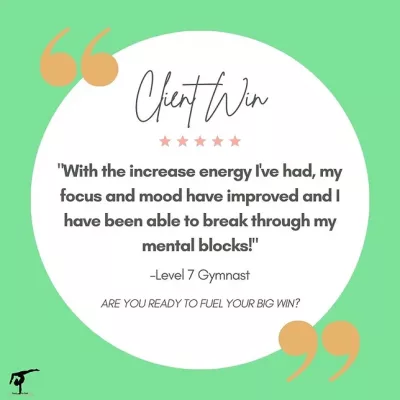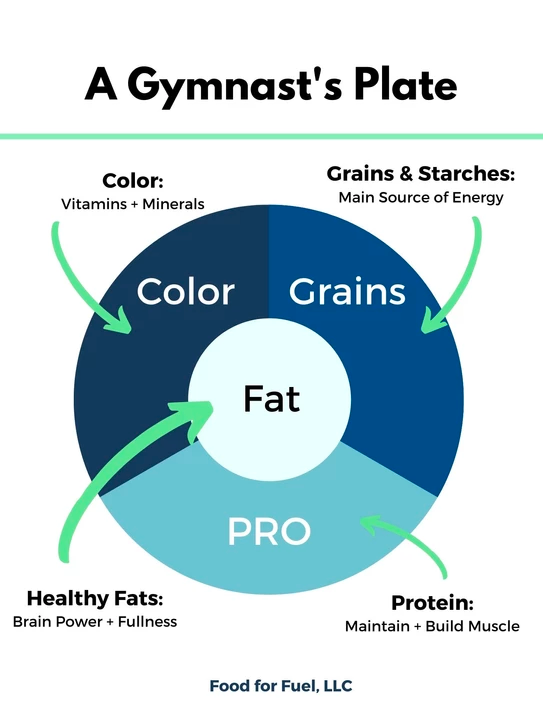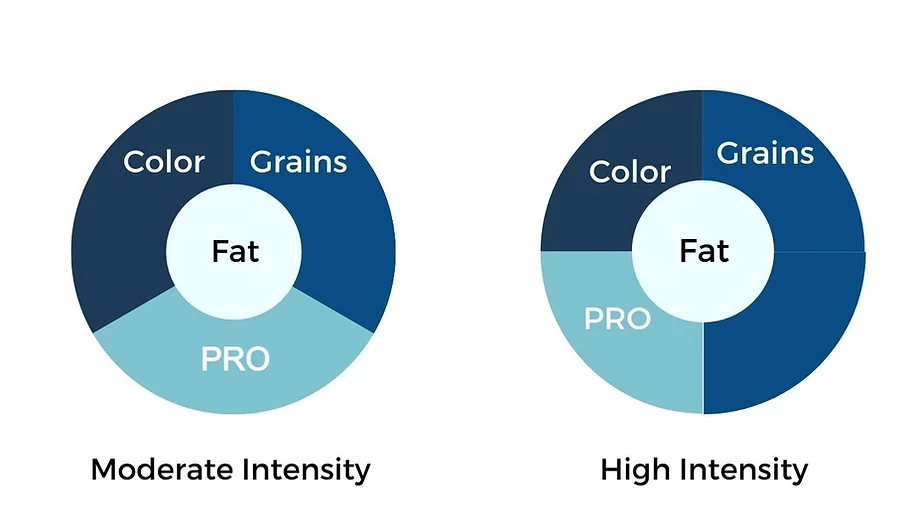
Kerry Bair RD on how nutrition could be influencing your mental performace in gymnastics.
One of the most frustrating things to deal with in gymnastics are mental blocks. Being terrified or forgetting how to do a skill that you know you are more than capable of performing.
A mental block is the inability to perform a skill that an athlete previously performed with no problems. Gymnasts with mental blocks often share that they feel stuck, frozen, blank, or brain fogged.
There are many causes of mental blocks in gymnastics. According to Mindset and Performance Coach, Rebecca Smith, MA, mental blocks can be caused by a number of factors, including
-
Social Factors or big changes (like a new coach, new gym, new school, etc.)
-
Ineffective Coaching
-
Fear of injury/re-injury
-
Fear of embarrassment
-
Perfectionism (fear of letting people down, fear of failure, fear of not looking good)
-
Negative imagery
-
Progressing too fast
-
Fear of success
-
Nerves
-
Growth, development, and other body changes
Most performance coaches teach mental toughness strategies to help gymnasts overcome their mental blocks. However, they are often missing a major piece of this puzzle!
Fueling!
Let me tell you a story about a gymnast in my Elite Coaching Program:
For the last 2 years, this gymnast struggled with mental blocks. They started on floor (with back tumbling) and pushed their way onto every event. Her mental blocks were bad, she left the gym frustrated and in tears almost every night.
This gymnast sought out nutrition support as a way to help improve her energy levels and helping her recover from injury. What she didn’t realize was how her difficulty focusing, difficulty controlling her mood, and mental blocks were also linked to being under-fueled!
Prioritizing nutrition, learning, and implementing simple strategies to better meet her body’s needs made all the difference for this gymnast! She now has the mental energy to implement her mental toughness training. She is able to work through challenges and not be overcome by frustration. She no longer leaves the gym in tears. And, she’s feeling more confident on the competition floor, competing skills she hasn’t been able to do in years!

The Link Between Mental Blocks and Under Fueling
The food you eat and the way you fuel your body can have major impacts on your mental state.
You have trouble focusing.
Do you ever feel like your brain is in a fog? Do you have difficulty focusing or struggle processing corrections? Is it difficult for you to comprehend complex skills or sequences? These could all be indicators that your brain does not have enough fuel to keep up with the intense demands of gymnastics.
Your mood is impacted.
Have you ever felt so hungry that you noticed a change in your mood. The most common mood associated with hunger is anger (aka feeling hangry), but really, any sudden change in mood or having an out-of-proportion reaction to a minor trigger can be a sign that your brain is low on energy and cannot regulate your emotions properly.
You let your emotions and frustrations get the best of you.
So, what can you do?
Try these 4 fueling strategies to help give your brain the energy it needs:
Eat Enough.
As a gymnast, your body and brain need a lot of energy! Of course you need energy to keep up in training and to support your recovery. But that’s really just the tip of the iceberg! Firstly, your body needs energy to live, run all of your organs and body’s systems, grow and develop, and do everyday activities.
When talking about energy in terms of food, most often we are referring to calories. I know that word gets thrown around a lot and can seem scary, but calories are just a measurement of energy in foods. Your goal is to get as close to 100% of the energy your needs (if not daily, as an average over time). Less is not always better: enough is best.
The best place to start when trying to eat enough is to follow your athlete’s plate at meals and include balanced snacks throughout the day! In an athlete’s plate, each section of your plate is taken up by grains and starches (for energy), protein (for muscles and recovery) and for fruits and vegetables (aka color for fiber, vitamins, and minerals).

Use the Athlete’s Plate as your personal blueprint to include your favorites from all the food groups (get the guide here!).
Eat Enough Carbohydrates
Carbohydrates are actually the brain’s preferred fuel source. When the body does not get enough carbohydrates, it is much more difficult to stay focused and keep your emotions in check.
At a minimum, the brain alone requires approximately 120g of carbohydrate each day (or what would be the equivalent of approximately 8 slices of bread, 3C of rice, or 5 bananas!) Most gymnasts require way more carbs than that — anywhere between 5-12g of carbohydrate per kilogram of body weight depending on their personal needs and demands of training and recovery. For many gymnasts this can mean eating close to 300-400g of carbohydrate each day!

-
For normal gymnastics training, 1/3 of your plate should be a grain or starch and 1/3 should be a fruit or vegetable
-
For high intensity gymnastics training (4+ hours daily, or gearing up for competition), 1/2 of your plate should be a grain or starch and 1/4 should be a fruit or vegetable
Eat Often
Another simple way to ensure you eat enough is to eat regular meals and snacks. A well-fueled gymnast eats on a schedule — every 2 to 3 hours, including:
-
3 main meals (likely breakfast, lunch, and dinner)
-
2-4 fueling snacks (including a morning snack, afternoon snack, pre-workout snack, mid-workout snack, recovery snack, and/or bedtime snack)
Include Nutrients for Brain Health
There are many micronutrients that play an important role in supporting brain health and function. A few of the most influential include:
-
Omega 3 Fats: found in fatty fish like salmon, tuna, mackerel, and sardines, walnuts, avocado, and flax seed. If you do not include seafood as a regular part of your diet, it may be a good idea to talk to your doctor about adding an Omega-3 supplement
-
Magnesium: found in nuts like almonds, peanuts, and cashews, whole grains like whole wheat, brown rice, and potatoes, and beans
-
Vitamin D: getting adequate sunlight exposure daily, including fortified foods such as milk, orange juice, cereal, and mushrooms, or discussing with your doctor if taking a supplement would be appropriate
-
Leafy Green Vegetables: including spinach, kale, collards, arugula, and broccoli
Be sure that these foods are regularly included in your fueling routine!
Kerry Bair, RD, is a Registered Dietitian and owner of Food for Fuel, LLC.
Original blog post can be found at: https://www.foodforfuelrd.com/post/the-link-between-mental-blocks-and-under-fueling